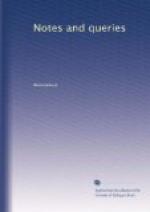This was not merely a poetical fancy, or a superstitious faith of the ignorant, for we find it laid down as a great physical truth by the greatest of the Greek philosophers, the divine Socrates:—
[Greek: “To de
dae meta touto epithumo humin chraesmodaesai, o
katapsaephisamenoi mou kai
gar eimi aedae entautha en o malist
anthropoi chraesmodousin hotan
mellosin apothaneisthai."][4]
In Xenophon, also, the same idea is expressed, and, if possible, in language still more definite and precise:—{117}
[Greek: “Hae de
tou anthropou psuchae tote daepou theiotatae
kataphainetai, kai tote ti
ton mellonton proora."][5]
Diodorus Siculus, again, has produced great authorities on this subject:—
[Greek: “Puthagoras ho Samios, kai tines heteroi ton palaion phusikon, apephaenanto tas psuchas ton anthropon uparchein athanatous, akolouthos de to dogmati touto kai progignoskein autas ta mellonta, kath hon an kairon en tae teleutae ton apo tou somatos chorismon poiontai."][6]
From the ancient writers I yet wish to add one more authority; and I do so especially, because the doctrine of the Stagirite is therein recorded. Sextus Empiricus writes,—
[Greek: “Hae psuchae,
phaesin Aristotelaes, promanteuetai kai
proagoreuei ta mellonta—en
to kata thanaton chorizesthai ton
somaton."][7]
Without encroaching further upon the space of this periodical by multiplying evidence corroborative of the same fact, I will content myself by drawing the attention of the reader to our own great poet and philosopher, Shakspeare, whose subtle genius and intuitive knowledge of human nature render his opinions on all such subjects of peculiar value. Thus in Richard II., Act ii. sc. 1., the dying Gaunt, alluding to his nephew, the young and self-willed king, exclaims,—
“Methinks I am a prophet new inspired;
And thus, expiring, do foretel of him.”
Again, in Henry IV., Part I., Act v. sc. 4., the brave Percy, when in the agonies of death, conveys the same idea in the following words:—
“O,
I could prophesy,
But that the earthy and cold hand of death
Lies on my tongue.”
Reckoning, therefore, from the time of Jacob, this belief, whether with or without foundation, has been maintained upwards of 3500 years. It was grounded on the assumed fact, that the soul became divine in the same ratio as its connection with the body was loosened or destroyed. In sleep, the unity is weakened but not ended: hence, in sleep, the material being dead, the immaterial, or divine principle, wanders unguided, like a gentle breeze over the unconscious strings of an AEolian harp; and according to the health or disease of the body are pleasing visions or horrid phantoms (aegri somnia, as Horace) present to the mind of the sleeper. Before death, the soul, or immaterial principle, is, as it were, on the confines of two worlds, and may possess at the same moment a power which is both prospective and retrospective. At that time its connection with the body being merely nominal, it partakes of that perfectly pure, ethereal, and exalted nature (quod multo magis faciet post mortem quum omnino corpore excesserit) which is designed for it hereafter.




